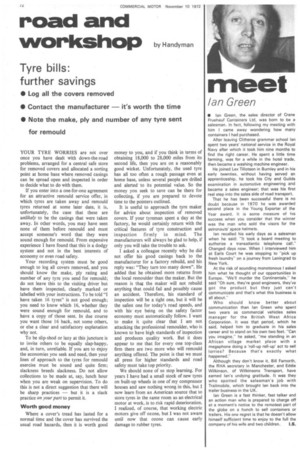road and
Page 70

If you've noticed an error in this article please click here to report it so we can fix it.
workshop by Handyman
Tyre bills: further savings
• Log all the covers removed • Contact the manufacturer — it's worth the time • Note the make, ply and number of any tyre sent for remould
YOUR TYRE WORRIES are not over once you have dealt with down-the-road problems, arranged for a central safe store for removed covers and allocated a sorting point at home base where removed casings can be spread open and inspected in order to decide what to do with them.
If you enter into a one-for-one agreement for an attractive remould service offer, in which tyres are taken away and remould tyres returned at some later date, it is, unfortunately, the case that these are unlikely to be the casings that were taken away. In other words, you may have seen none of them before remould and must accept someone's word that they were sound enough for remould. From expensive experience I have found that this is a dodgy system and not in the best interests of economy or even road safety.
Your recording system must be good enough to log all covers removed, and you should know the make, ply rating and number of any tyre you send for remould; do not leave this to the visiting driver but have them inspected, clearly marked or labelled with your instructions. To be told "I have taken 16 tyres" is not good enough; you need to know which 16, whether they were sound enough for remould, and to have a copy of those sent. In due course you want those 16 back, not some others, or else a clear and satisfactory explanation why not.
To be slip-shod or lazy at this juncture is to invite others to be equally slap-happy, and, in turn, unreliable. If you are to enjoy the economies you seek and need, then your lines of approach to the tyres for remould exercise must be sound and quite firm; slackness breeds slackness. Do not allow collections to be made at, say, lunch hour when you are weak on supervision. To do this is not a direct suggestion that there will be sharp practices — but it is a slack practice on your part to permit it.
Worth good money Where a cover's tread has lasted for a normal time and the cover has survived the usual road hazards, then it is worth good money to you, and if you think in terms of obtaining 18,000 to 28,000 miles from its second life, then you are on a reasonably good wicket. Unfortunately, the used tyre has all too often a rough passage even at home base, unless several people are drilled and alerted to its potential value. So the money you seek to save can be there for collecting, if you are prepared to devote time to the pointers outlined.
It is useful to approach the tyre maker for advice about inspection of removed covers. If your tyreman spent a -day at the factory, he would certainly return with the critical features of tyre construction and inspection firmly in mind. The manufacturers will always be glad to help, if only you will take the trouble to ask.
asked a colleague recently why he did not offer his good casings back to the manufacturer for a factory rebuild, and his reply was: "They turn too many down". He added that he obtained more returns from the local remoulder than the maker. But the reason is thai the maker will not rebuild anything that could fail and possibly cause an accident. Therefore, his standard of inspection will be a tight one, but it will be the safest one for today's road speeds, and with his eye being on the safety factor economy must automatically follow. I want to make it quite dear that I am not attacking the professional remoulder, who is known to have high standards of inspection and produces quality work. But it does appear to me that for every one top-class firm there are two more who will remould anything offered. The point is that we must all press for higher standards and road safety must take top priority.
We should none of us stop learning. For years I have had a small stock of new tyres on built-up wheels in one of my compressor houses and saw nothing wrong in this, but I now learn from an American source that to store tyres in the same room as an electrical motor at work, is to risk rapid deterioration. I realized, of course, that working electric motors give off ozone, but I was not aware until now that ozone can cause early damage to rubber tyres.




































































































































